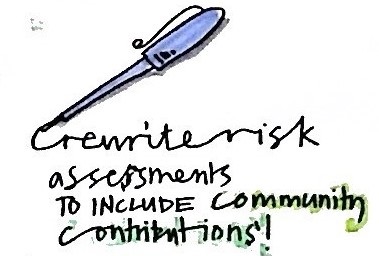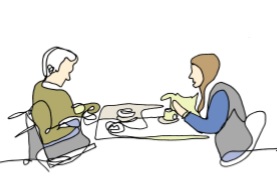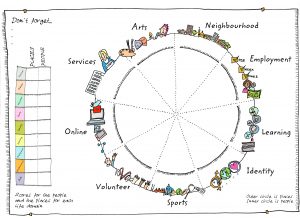This strand of my life is lived out through my role as an Associate with the National Development Team for Inclusion (check out this 3 minute video describing NDTi or here to go to the NDTi homepage). I have been with the NDTi since 1999, and have worked with around 150 organisations across the United Kingdom. Most of this work has been with services that support people experiencing mental health issues or living with learning disabilities, but some work has been with other groups. Lots of the work is about being human, so it is easy to apply it anywhere.
Thinking about care homes, nursing homes and hospitals
Click here to go to a page of resources about care homes, including:
- What is the impact of physical environment and belongings?
- Are care homes like a family?
- Eating together
- Building community connections
- Going out and transport
- Risk assessment
- Locked environments (forensic hospitals)
- Closing a care home and transferring to a new place
Please may I have a copy of my scan?
I am involved with a research project during which participants are invited to undergo a magnetic resonance imaging (MRI) scan. People, of course, have a right to receive a copy of the scan image, and, indeed, some people have asked for a copy of their scan image. A bunch of us mused about why, and then looked at some of the literature. Read more here.

Austerity Triangles
The Austerity Triangles help in thinking through how to promote independence and inclusion in an age of austerity. Financial pressures have combined with demographic changes and service transformation to create an unprecendented squeeze on health and social care services. The Austerity Triangles provide a new way to generate practical ideas that hold on to the fundamental goals of services while addressing the gritty reality of life on the front line. Participants leave the whole-day workshop with ideas about how to move forward with individuals, colleagues and management.
Forensic services for people 55+
What is life like for people aged 55 or older who use forensic mental health services? What are the issues that they face, what gets in the way and what helps? The Lived Experience Advisory Group for this research study are adding real value to the work.
Commissioning services for autistic people
What would brilliant commissioning look like for autistic people? This page draws together a few resources that might start to address this question. See more…

Team Risk Climate
CAIRO is a self-audit tool that links team climate with risk management. You can benchmark your team’s approach to risk against others and build an action plan. It’s written up in a book chapter here and the whole team audit tool is available for free online use from here.
Staff-run to Self-run
Before the recession, staff in the health and social care sector would often run support groups for the people using their services. Many such groups have already closed due to pressures upon the staff. But there is an alternative – to support the group to make the transition from being run by a staff member to being self-run. Drawing on the pioneering work of The Network in Barnet, the guide here sets out one way to plan for this.
Personal Hygiene
It’s hard to be included if your clothes are unwashed and your body smells. Why is it so hard to discuss poor hygiene, when we all know people who struggle with this issue? A two year investigation has unearthed some fascinating insights into this baffling and hazardous lifestyle. You can:
- book a training day for your multi-agency safeguarding panel or others who are interested in working out local solutions together – just click the saleroom tab;
- check out some resources already assembled, including a checklist here which gives a few starting points for action; a paper reflecting on whose needs are being met here and an online book on the topic here.
Social Inclusion Training Pack
This is a resource file explaining many different ways to support someone to build an included life. There are a few copies left and training is available, so please get in touch. An early version of this catalogue of interventions designed to promote inclusion can be found in chapter 11 of Rachel Perkins and Julie Repper’s book Social Inclusion and Recovery here.
A training day on Community Mapping helps you move beyond simple directories to explore fundamental attitudes towards communities, the assets carried by informal networks and the ever-changing microclimates hosted within all community organisations. A really simple checklist for use when visiting a community setting is available here, and there’s more detailed material in the Subject Index.
Green Light Toolkit
An examination of how mainstream mental health services respond to the needs of people who also have autism or learning disabilities. The 2022 version of the Green Light Toolkit is available here. If you use the online audit, you can obtain a report of your team’s average scores like this example. There is a one minute description of the Green Light Toolkit in this NHS England video (3:06 to 3:58).
An archive of previous editions and reports include the 2012 Reasonably Adjusted? report and the 2017 Green Light Toolkit. A long reading list on this topic can be found here, easy-read resources are here and an assortment of other interesting resources are here.
Advocacy Quality Performance Mark
I am working with QPM to assess Advocacy organisations against their Quality Performance Mark. The QPM has been devised in partnership with Advocacy organisations and is a rigorous process of document review and interview that leads to the award of the QPM award of service quality. More here.
Social inclusion
I have been training services in socially inclusive practice for twenty years and have a wide range of resources to help you support individuals at risk of exclusion. The goal is to move from attending to belonging, and to have the same opportunities as everyone else. You can download a listing of half day modules and their learning outcomes here or read more about it in the book chapter I wrote with Jo Seddon in 2008 here.
The Inclusion Web
This is an evaluation tool that works with the person to plan and evaluate progress towards an included life. See here for further information.

(Graphic drawn by Jon Ralphs see his website here)

Recent Comments